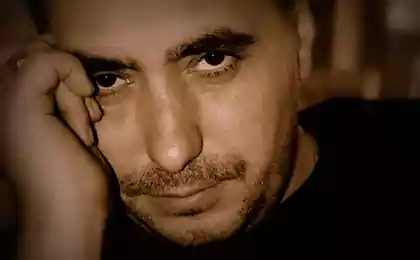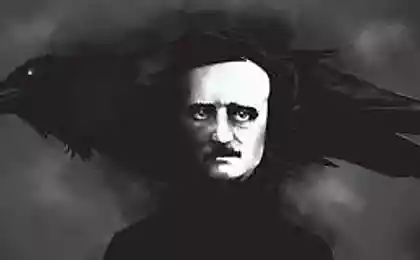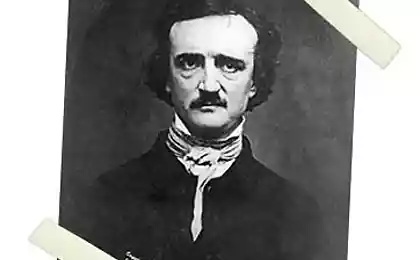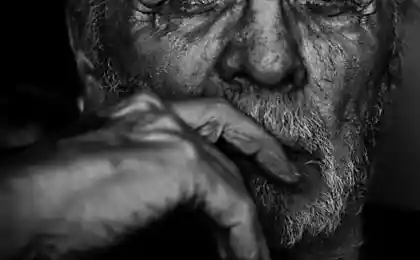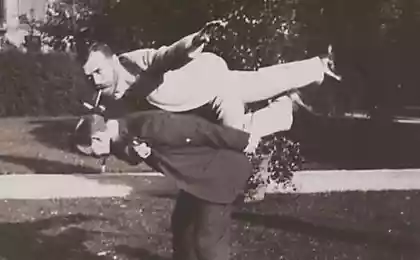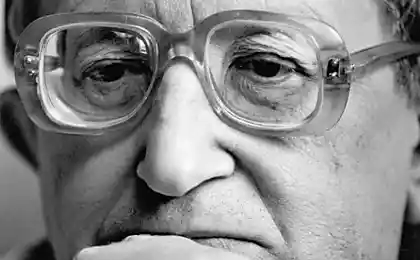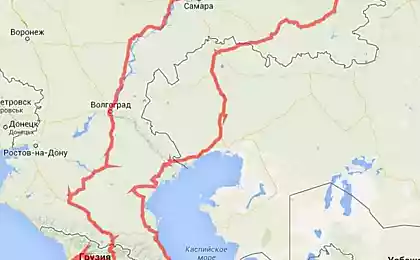547
"Experience is wisdom": the writer Alexander Grigorenko about finding your place on earth
Experience is wisdom": the writer Alexander Grigorenko of the mythology of Northern peoples and finding their place on earth. Can people exist in harmony with nature, is there life in the forest and why the Mongols — the greatest rationalists of his time: a conversation with Alexander Grigorenko, whose novel "Ilhet" this year claim to the prize "Big book". When I read the novel "Ilhet" I was chased three literary associations: the obvious — Jack London; less obvious — Charles Dickens; it is not obvious — "peer Gynt" by Ibsen. Let's start with London. "Algete" — as well as in the works of an American classic — special place is dedicated to man's relationship with nature. But if London depicts this relationship as an eternal struggle, the heroes "Elgeta", despite the severe conditions of life still manage to exist in harmony with the world around them. How do you think man and nature are enemies or partners?
— Jack London — man of the new time, when nature was perceived as the environment. New age man can be careful to nature or to conquer her, but the conversation with nature is impossible for him, because he doesn't see it as being as equal or even superior to — face dialogue. I'm talking about the conversation with nature as on the literary market, and in the most literal sense, as it was the Gentiles who had seen the world — animals, rocks, birds, water, herbs, trees — as a community of living beings of nature, logic, laws, unpredictability, that is, all properties of the person. "Algete" (as in "Mabati") harmony with nature is not that characters have the right "environmental consciousness" and that they can quarrel and make peace with the river, to complain to the stone, to feel guilty before the beast, to ask the advice of the moon, be less guarded in the face of fire, because I know his resentment…
— That is a conversation with nature is an attribute primarily of the pagan mind?
— It is not even paganism is too broad concept: the world of Francis of Assisi was and "brother Fire" and "brother Iron" and "brother Wolf" and a whole sonmische "brothers" and "sisters". In the end, the Christian knows about the prohibition to worship the creature, but he also knows that nature created by the Creator, each object or creature bear the glare of its life-giving power and therefore require a reverent attitude. And when there is no pagan "conversation", nor Christian piety, can only rely on common sense, laws and other unreliable things. Losev's I remember the idea that no myth can exist no awareness, even through science: is mythology of sunlight and light bulbs mythology, mythology living and nonliving. The way nature or Vice versa — it all depends on what we more — living or dead. In the best examples of our "rustic" nature of the classics — the same character, like people Astafieva human judges fish, Rasputin people suffer from this, not poetic guilt towards the ground. Approximately the same relationship with nature there are actually, however, rare. But I think all is not lost.
Sixty four million seven hundred eighty five thousand six hundred eighty two
Anton Petrov/ Siburbia.ru
— I was very impressed by the Chapter "Wife-wolf", where a woman, a devoted husband, rescues from death the wolf — and she becomes a wolf and pays him for it undivided loyalty. Can we say that this Chapter is a metaphor of love? Or you wanted to invest it in some other sense?
— Perhaps the only thing in the book is the plot, taken from the Northern legends almost unchanged. In Nenets there are several versions of stories about his wife-wolf: one young marries not for love, why they hate each other, the other wife is a slob, the third is the adulteress. That is, the reasons are different, but the outcome is the same: the husband interrupts his wife's hands and feet, casts a die, a woman makes a wolf, she turns to the wolf and cuts the throat of the former husband. Maybe it's a metaphor of love, but love is wider than any of the metaphors. Such a suitable metaphor for the Mind, the woman who dreamed of becoming a fish so that the children flew from her eggs: she is actually fertility, which gives it a transcendent loyalty and the same hatred. In my opinion, a more complete metaphor of love — humped the wolf, because he has an incredible power of compassion, that can not save from death and give new life. When I read Nenets tales — they are very short — I was amazed it was the wolf, not a woman.
"There is a mythology of sunlight and light bulbs mythology, mythology living and nonliving. The way nature or Vice versa — it all depends on what we more — dead or alive»
— How accurately you are playing the North folk epic in the novel?
— In addition to the ties with children, slaves, wives wolf, and still very few — all made up. Just that are faced with these stories, I suddenly realized that the attack on the material, which allows me to talk about those things that I had wanted to say but couldn't.
— What are you so fascinated with this world?
— Probably, the fact that focuses on the action of the almost complete lack of descriptiveness. Life is cruel, gentle and quiet. Taiga and tundra all the world sparsely populated, so there is every creature in sight. But most importantly, taiga is not in our consciousness any associations, and it allows you to create your world from scratch — a world which, for all its fabulousness, quite real.
— Can you confirm that you are using "Elgeta" sought not only to tell an exciting story, to put before the reader a series of questions of a philosophical nature, but also arouse his interest in the culture and life of the people of whom we, alas, know very little? And if so, why did you decide to do this with artwork, and not, say, a documentary-ethnographic research?
— Honestly, I do not consider myself an expert on the folklore of the taiga peoples. I had a desire to "inhabit" the forest, which in the Russian cultural consciousness, it is possible to tell, uninhabited. Because I am in some degree a resident of taiga, while on work travel in million Krasnoyarsk and in General possess all the habits of the typical citizen. Taiga is what surrounds me, I always wanted to know what happened here, maybe a thousand years ago or even earlier, though of course I understand that this is unlikely. Pre-Russian Siberia has almost no recorded history, it can only be conjecture based on folklore. Rather, it is the case when poetry replaces science. In the end about the real Trojan war we know from Homer — the achievements of archeology can only here to add something.
— If London is clear, the Dickensian with your creative style in common is, in my opinion, the genre originality. "Ilhet" is a Roman proverb and the novel-education, and an adventure novel (and here memory comes from "Oliver Twist"). How would you define the genre of your book?
— I think it's something close to epic, because there is a look from space, are the motives of conquest, travel, and most importantly, spirits, people, animals exist in the same plane.
— In the "Algete" there are many elements of a fairy tale: from the motive the mysteries of birth and ending with several secondary characters who at the critical moment rescue Illget out of trouble. Whether way Illget some fairytale archetype? For example, Ivan the fool?
— Ivan the fool there's just no, like, probably, any "finish" fairy tale characters. I wanted to tell the story of a man whom fate throws from nothingness to greatness, from humiliation to power, and so on to infinity, Willy-nilly, raises old questions: who is to blame? What do you really stand? What clutch is created every situation and does fate really exist? Instead of "ready" hero is a cross-cutting theme that is found in legends of many Northern peoples, about how lucky the warrior takes it in the booty young children of the enemy, raising them in their families, but the children do not survive. Variants of the story a lot, but the plot is almost always the same, and to me it is also useful.
Seven million five hundred ninety nine thousand one hundred fifty nine
Anton Petrov/ Siburbia.ru
— Until then, until "Algete" does not appear to be hordes of Mongols, novel time, there is quite abstract: the myth and reality are intertwined so closely that it is impossible to know exactly when the action takes place. But in the third part of you suddenly unleashes on the reader a particular historical time. Why such a sharp transition from private story to story universal?
— This failure in the history I needed, because he really was. Historically is known about him, by and large, only that in 1218 Jochi, son of Genghis Khan, launched a punitive expedition on the ice of the Yenisei river "for two months". The rest remains only to conjecture — especially how people living in nature, living their private lives, unwittingly fall into a very different reality. We talked about Jack London, the heathen conversations with nature and new time — in fact, it is the failure of paganism in modernity, from the spirit world into the world of numbers. The Mongols — the greatest rationalists of his time. This small Prairie people conquered half the world not because it had any particular ferocity: the Mongols just less wrong than all the others, much less. Genghis Khan brought the art of managing the masses of people to such an extent that the probability of miscalculation was destroyed in the Bud. He (and his double, taiga Abto) wanted to bring order in a world where everyone lives by himself, reeling where you want, and loose where it should and need to do, as you say, then there will be order. This order is history.
— I like a man who grew up on the novels of James Fenimore Cooper, Conan Doyle and London, I understand that now there is an acute shortage of good children's adventure literature. And for me "Ilhet" valuable the fact that this is a book that I would give to read to your children when they turn 12-13 years old. Perhaps they do not understand everything, but they will definitely be something the characters have to learn. You are not afraid of possible prospect to obtain the status of author who writes for young people? You shared writers for children and adults?
As said Chukovsky, "for children need to write in the same way as for adults, only better." Korney Ivanovich I love, as I can remember, and I think that's good, as the kids say, "vsechny". So the prospect of becoming a writer for young people does not scare me, although, frankly, I'm not focused on the reader of a particular age. For me the important people who are interesting to themselves.
Perhaps most difficult for young readers character "Elgeta" will be a Doll of a Man — a kind of eternal spy story that looks at what is happening with the podium with his cruel wisdom. And here we come to the question about the proximity of your novel to Gentiane where there are also a number of characters who evaluate the actions of the Pen and become spokesmen for the author's position, being as though over the narrative. Can we say that the Doll Person is your novel alter-ego that he broadcasts your thoughts? What is the symbolism of the nickname "Doll Man"?
"I wanted to tell the story of a man whom fate throws from nothingness to greatness, from humiliation to power, and so on to infinity»
Doll Man we have is a picture of the deceased, near to which usually put a drink, something to eat and believe that it's how we maintain a connection with him, to "feed" it. From the Northern indigenous people there was no photography, so they cut out the doll that represented the deceased, and also shared with her meal. The expression "dry as a doll person," said a deep man, I met once and don't remember where, but this hyperbole of old age I was interested in — and there was this character. Doll Man if is my alter-ego, approximately the same extent that most other characters — each one has a part of me. What has the Doll Person, is hardly a wisdom — because experience is wisdom. Rather, this character shows the tragedy of a lost life. People think that you do not have time to understand something important for offensive short of his century, and the Doll, a joke of the gods, given as many lives as parts of the ridge pike. But having lived almost this endless age, he never found in life besides boring repetition. He found that there was something infinite, inexhaustible inspire hope — God. Life for him became unbearable, he wants to get rid of.
— As peer Gynt, Illget throughout the entire novel struggling to find themselves. Trying on different masks, Feathers, as it seemed like one — "be yourself". But, as he later explained Durski grandfather, followed the formula of trolls: "revel yourself". And what he wants Illget? And that he in the end gets?
— Ilet in the story looking for "their river", his place on earth, and finds it, but then it turns out that his destiny is an endless journey in search of what you haven't found a doll of a Person. Illget does not receive a ready answer, he receives only this answer, which I think is enough for a person to be lived and not considered life a torment. And everything that comes after the answer is found — is apologetics, not literature.
Source: theoryandpractice.ru
— Jack London — man of the new time, when nature was perceived as the environment. New age man can be careful to nature or to conquer her, but the conversation with nature is impossible for him, because he doesn't see it as being as equal or even superior to — face dialogue. I'm talking about the conversation with nature as on the literary market, and in the most literal sense, as it was the Gentiles who had seen the world — animals, rocks, birds, water, herbs, trees — as a community of living beings of nature, logic, laws, unpredictability, that is, all properties of the person. "Algete" (as in "Mabati") harmony with nature is not that characters have the right "environmental consciousness" and that they can quarrel and make peace with the river, to complain to the stone, to feel guilty before the beast, to ask the advice of the moon, be less guarded in the face of fire, because I know his resentment…
— That is a conversation with nature is an attribute primarily of the pagan mind?
— It is not even paganism is too broad concept: the world of Francis of Assisi was and "brother Fire" and "brother Iron" and "brother Wolf" and a whole sonmische "brothers" and "sisters". In the end, the Christian knows about the prohibition to worship the creature, but he also knows that nature created by the Creator, each object or creature bear the glare of its life-giving power and therefore require a reverent attitude. And when there is no pagan "conversation", nor Christian piety, can only rely on common sense, laws and other unreliable things. Losev's I remember the idea that no myth can exist no awareness, even through science: is mythology of sunlight and light bulbs mythology, mythology living and nonliving. The way nature or Vice versa — it all depends on what we more — living or dead. In the best examples of our "rustic" nature of the classics — the same character, like people Astafieva human judges fish, Rasputin people suffer from this, not poetic guilt towards the ground. Approximately the same relationship with nature there are actually, however, rare. But I think all is not lost.
Sixty four million seven hundred eighty five thousand six hundred eighty two
Anton Petrov/ Siburbia.ru
— I was very impressed by the Chapter "Wife-wolf", where a woman, a devoted husband, rescues from death the wolf — and she becomes a wolf and pays him for it undivided loyalty. Can we say that this Chapter is a metaphor of love? Or you wanted to invest it in some other sense?
— Perhaps the only thing in the book is the plot, taken from the Northern legends almost unchanged. In Nenets there are several versions of stories about his wife-wolf: one young marries not for love, why they hate each other, the other wife is a slob, the third is the adulteress. That is, the reasons are different, but the outcome is the same: the husband interrupts his wife's hands and feet, casts a die, a woman makes a wolf, she turns to the wolf and cuts the throat of the former husband. Maybe it's a metaphor of love, but love is wider than any of the metaphors. Such a suitable metaphor for the Mind, the woman who dreamed of becoming a fish so that the children flew from her eggs: she is actually fertility, which gives it a transcendent loyalty and the same hatred. In my opinion, a more complete metaphor of love — humped the wolf, because he has an incredible power of compassion, that can not save from death and give new life. When I read Nenets tales — they are very short — I was amazed it was the wolf, not a woman.
"There is a mythology of sunlight and light bulbs mythology, mythology living and nonliving. The way nature or Vice versa — it all depends on what we more — dead or alive»
— How accurately you are playing the North folk epic in the novel?
— In addition to the ties with children, slaves, wives wolf, and still very few — all made up. Just that are faced with these stories, I suddenly realized that the attack on the material, which allows me to talk about those things that I had wanted to say but couldn't.
— What are you so fascinated with this world?
— Probably, the fact that focuses on the action of the almost complete lack of descriptiveness. Life is cruel, gentle and quiet. Taiga and tundra all the world sparsely populated, so there is every creature in sight. But most importantly, taiga is not in our consciousness any associations, and it allows you to create your world from scratch — a world which, for all its fabulousness, quite real.
— Can you confirm that you are using "Elgeta" sought not only to tell an exciting story, to put before the reader a series of questions of a philosophical nature, but also arouse his interest in the culture and life of the people of whom we, alas, know very little? And if so, why did you decide to do this with artwork, and not, say, a documentary-ethnographic research?
— Honestly, I do not consider myself an expert on the folklore of the taiga peoples. I had a desire to "inhabit" the forest, which in the Russian cultural consciousness, it is possible to tell, uninhabited. Because I am in some degree a resident of taiga, while on work travel in million Krasnoyarsk and in General possess all the habits of the typical citizen. Taiga is what surrounds me, I always wanted to know what happened here, maybe a thousand years ago or even earlier, though of course I understand that this is unlikely. Pre-Russian Siberia has almost no recorded history, it can only be conjecture based on folklore. Rather, it is the case when poetry replaces science. In the end about the real Trojan war we know from Homer — the achievements of archeology can only here to add something.
— If London is clear, the Dickensian with your creative style in common is, in my opinion, the genre originality. "Ilhet" is a Roman proverb and the novel-education, and an adventure novel (and here memory comes from "Oliver Twist"). How would you define the genre of your book?
— I think it's something close to epic, because there is a look from space, are the motives of conquest, travel, and most importantly, spirits, people, animals exist in the same plane.
— In the "Algete" there are many elements of a fairy tale: from the motive the mysteries of birth and ending with several secondary characters who at the critical moment rescue Illget out of trouble. Whether way Illget some fairytale archetype? For example, Ivan the fool?
— Ivan the fool there's just no, like, probably, any "finish" fairy tale characters. I wanted to tell the story of a man whom fate throws from nothingness to greatness, from humiliation to power, and so on to infinity, Willy-nilly, raises old questions: who is to blame? What do you really stand? What clutch is created every situation and does fate really exist? Instead of "ready" hero is a cross-cutting theme that is found in legends of many Northern peoples, about how lucky the warrior takes it in the booty young children of the enemy, raising them in their families, but the children do not survive. Variants of the story a lot, but the plot is almost always the same, and to me it is also useful.
Seven million five hundred ninety nine thousand one hundred fifty nine
Anton Petrov/ Siburbia.ru
— Until then, until "Algete" does not appear to be hordes of Mongols, novel time, there is quite abstract: the myth and reality are intertwined so closely that it is impossible to know exactly when the action takes place. But in the third part of you suddenly unleashes on the reader a particular historical time. Why such a sharp transition from private story to story universal?
— This failure in the history I needed, because he really was. Historically is known about him, by and large, only that in 1218 Jochi, son of Genghis Khan, launched a punitive expedition on the ice of the Yenisei river "for two months". The rest remains only to conjecture — especially how people living in nature, living their private lives, unwittingly fall into a very different reality. We talked about Jack London, the heathen conversations with nature and new time — in fact, it is the failure of paganism in modernity, from the spirit world into the world of numbers. The Mongols — the greatest rationalists of his time. This small Prairie people conquered half the world not because it had any particular ferocity: the Mongols just less wrong than all the others, much less. Genghis Khan brought the art of managing the masses of people to such an extent that the probability of miscalculation was destroyed in the Bud. He (and his double, taiga Abto) wanted to bring order in a world where everyone lives by himself, reeling where you want, and loose where it should and need to do, as you say, then there will be order. This order is history.
— I like a man who grew up on the novels of James Fenimore Cooper, Conan Doyle and London, I understand that now there is an acute shortage of good children's adventure literature. And for me "Ilhet" valuable the fact that this is a book that I would give to read to your children when they turn 12-13 years old. Perhaps they do not understand everything, but they will definitely be something the characters have to learn. You are not afraid of possible prospect to obtain the status of author who writes for young people? You shared writers for children and adults?
As said Chukovsky, "for children need to write in the same way as for adults, only better." Korney Ivanovich I love, as I can remember, and I think that's good, as the kids say, "vsechny". So the prospect of becoming a writer for young people does not scare me, although, frankly, I'm not focused on the reader of a particular age. For me the important people who are interesting to themselves.
Perhaps most difficult for young readers character "Elgeta" will be a Doll of a Man — a kind of eternal spy story that looks at what is happening with the podium with his cruel wisdom. And here we come to the question about the proximity of your novel to Gentiane where there are also a number of characters who evaluate the actions of the Pen and become spokesmen for the author's position, being as though over the narrative. Can we say that the Doll Person is your novel alter-ego that he broadcasts your thoughts? What is the symbolism of the nickname "Doll Man"?
"I wanted to tell the story of a man whom fate throws from nothingness to greatness, from humiliation to power, and so on to infinity»
Doll Man we have is a picture of the deceased, near to which usually put a drink, something to eat and believe that it's how we maintain a connection with him, to "feed" it. From the Northern indigenous people there was no photography, so they cut out the doll that represented the deceased, and also shared with her meal. The expression "dry as a doll person," said a deep man, I met once and don't remember where, but this hyperbole of old age I was interested in — and there was this character. Doll Man if is my alter-ego, approximately the same extent that most other characters — each one has a part of me. What has the Doll Person, is hardly a wisdom — because experience is wisdom. Rather, this character shows the tragedy of a lost life. People think that you do not have time to understand something important for offensive short of his century, and the Doll, a joke of the gods, given as many lives as parts of the ridge pike. But having lived almost this endless age, he never found in life besides boring repetition. He found that there was something infinite, inexhaustible inspire hope — God. Life for him became unbearable, he wants to get rid of.
— As peer Gynt, Illget throughout the entire novel struggling to find themselves. Trying on different masks, Feathers, as it seemed like one — "be yourself". But, as he later explained Durski grandfather, followed the formula of trolls: "revel yourself". And what he wants Illget? And that he in the end gets?
— Ilet in the story looking for "their river", his place on earth, and finds it, but then it turns out that his destiny is an endless journey in search of what you haven't found a doll of a Person. Illget does not receive a ready answer, he receives only this answer, which I think is enough for a person to be lived and not considered life a torment. And everything that comes after the answer is found — is apologetics, not literature.
Source: theoryandpractice.ru
The desire for justice was stronger than thirst
Tincture of pine cones with Apple cider vinegar from a stroke


